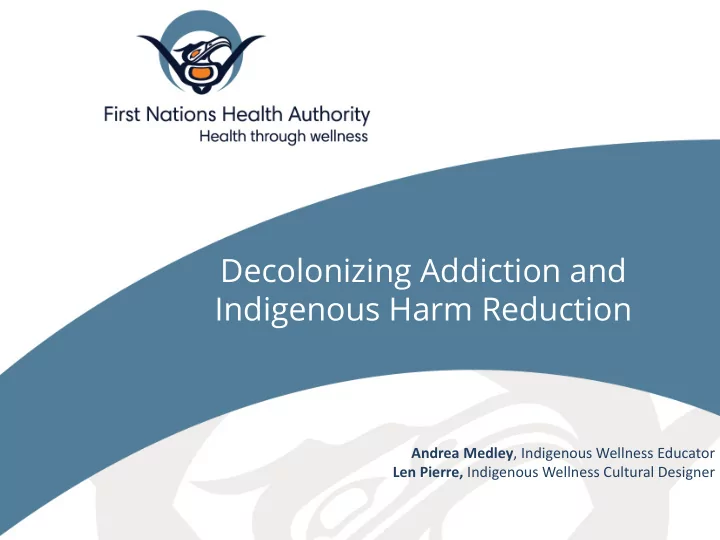

Decolonizing Addiction and Indigenous Harm Reduction Andrea Medley , Indigenous Wellness Educator Len Pierre, Indigenous Wellness Cultural Designer
Overview 1. Why We’re Here 2. Decolonizing Addiction 3. Indigenous Harm Reduction 4. Sneak Preview 2
Background 86+ communities distributing Naloxone 100+ workshops since May 2016 Beyond the crisis: looking at transformation Working together 3
Provincial Emergency Update 4
Released July 28 th , 2017 5
6
How do you define addiction? 7
www.fnha.ca Definition of Addiction Medical? Criminal? Social? Individual? _________? 8
Decolonizing Addiction: Why? 9
www.fnha.ca Decolonizing Addiction: Myths Myth 1: “ Addiction is a choice, and if you loved me you would stop using substances” 10
www.fnha.ca Decolonizing Addiction: Myths Myth 2: “We need to kick out people who sell drugs out of the community to stop the problem” 11
www.fnha.ca Decolonizing Addiction: Myths Myth 3: “Rock - bottom factor” 12
www.fnha.ca Decolonizing Addiction: Myths Myth 4: “All people who use substances are addicted” 13
www.fnha.ca What about Prescription Drugs? 14
15
www.fnha.ca 16
www.fnha.ca Harm Reduction Culture & Tradition Fishing, Hunting, Needle Distribution, Storytelling, Language, Condoms, Outreach, Gathering, Artwork, Relationships, Support, Canoeing, Singing, Education, Dignity Dancing, Ceremony, Human Rights Spending Time With Each Other Compassion, Mindful Judgmental, Relationships, Inclusion, Patience, Care, Positive Communication, Meeting People Where They Are At 17
www.fnha.ca Indigenous Harm Reduction Principles & Practice 18
www.fnha.ca Indigenous Harm Reduction Principles & Practice Relationships Relationships Strength and Identity and Knowledge and and Care and Care Protection Transformation Wisdom Healing requires Healing is Healing involves Healing requires working embedded in finding out who time, patience together as one culture and you are and and reflection heart and one tradition accepting who mind you were 19
www.fnha.ca This looks like: • Forming relationships and providing outreach to people who seek support This sounds like: • Connecting with people who use substances over something other than their substance use Relationships and Care 20
www.fnha.ca This looks like: • Recognizing that culture and tradition are intergenerational strengths and keep communities resilient This sounds like: • Practicing culture and tradition and maintaining connection and Strength and Protection relationships 21
www.fnha.ca This looks like: • Meeting people where they are at on their healing journey and being mindful of where we are at on our healing journey This sounds like: • Providing good information and resources, actively working to reduce stigma, and being mindful of the Knowledge and Wisdom way we talk about substance use 22
www.fnha.ca This looks like: • Providing ongoing opportunities for compassion and inclusion along the healing journey This sounds like: • Acknowledging that substance use is a journey, with abstinence not always as the end goal Identity and Transformation 23
Sneak Preview 24
Lessons Learned 25
www.fnha.ca Questions/Comments Indigenous Wellness Team: stbbi@fnha.ca http://www.fnha.ca/overdose http://towardtheheart.com/ 26
Recommend
More recommend